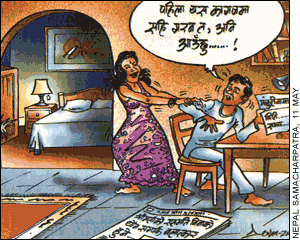 "A husband will now have to submit a written application and get approval to have sex with his wife!"
"A husband will now have to submit a written application and get approval to have sex with his wife!"
"A man will now have to beg for sex in his own home."
"A wife can now send her husband to jail on a whim."
These are some of the headlines and comments in the Nepali media after the 3 May Supreme Court ruling that martial sex without the wife's consent should be considered rape.
The judgement came in response to a petition filed in July 2001 by the Forum on Women, Law and Development, and is widely welcomed by activist groups, although a conservative and male-dominated public has tried to ridicule it. In a 15-page judgement released last week the Supreme Court stresses that Hindu religious texts highlight conjugal harmony based on mutual understanding, and nowhere give a husband the leeway to inflict inhuman acts such as rape upon his wife.
"We filed the petition after several women approached us complaining that their husbands were forcing them to have sexual relations," says lawyer Sapana Pradhan Malla of the Forum. As no charges could be made on those grounds since there was no law, legal activists collaborated to present a test case in court. The court has directed parliament to amend the present rape laws to reflect the ruling.
Malla admits there has been some mockery of the Supreme Court ruling, but says the news isn't all bad. "Apart from a few cartoons ridiculing the judgement, and some write-ups arguing that it undermines Hindu social and religious values and threatens social harmony, most of the feedback has been positive," she says.  "The judgement has addressed the root cause of the problem-that patriarchal values derive their authority by controlling sexuality. Recognising rape within marriage as a crime is the first step. The second step is to amend the law [regulating rape] and to get it passed in parliament. Third, enforcement and awareness measures have to be put into place to create an environment that allows victims to come forward," says Malla. "After all, how many women will dare challenge the institution of marriage."
"The judgement has addressed the root cause of the problem-that patriarchal values derive their authority by controlling sexuality. Recognising rape within marriage as a crime is the first step. The second step is to amend the law [regulating rape] and to get it passed in parliament. Third, enforcement and awareness measures have to be put into place to create an environment that allows victims to come forward," says Malla. "After all, how many women will dare challenge the institution of marriage."
A few have, however. A young mother of three, Roshni (name changed) is bent on getting a divorce. She has decided to brave the disapproval of family and society, because she cannot take the constant physical and sexual abuse she faces from her alcoholic husband anymore-her reproductive organs were damaged after her husband repeatedly raped her while she was recovering from a delivery.
A shiver runs up Basundhara Thapa's spine every time she thinks of Roshni. A seasoned attorney who offers free legal aid to women, Thapa finds it hard to speak when she recalls the young woman's bruised and battered body and her desperate appeals for counsel. "It is unbelievable what can go on behind the surface of what appears to be an ideal marriage. Battery and physical abuse is one extreme. But the instances of sexual abuse some women face are often unimaginable," says Thapa, who works through the Legal Aid Consultancy Centre's Women's Rights Helpline Project in Kathmandu. She's helping Roshni get a divorce.
Since its establishment in 1987, the Legal Aid Consultancy Centre (LACC) has been offering legal aid to hundreds of Nepali women seeking legal recourse-including separation or divorce as a last resort-against husbands who've made life for them a living hell. Since LACC set up its Women's Rights Helpline Project in January 1999, it has provided legal aid and advice to nearly 6,000 women on issues ranging from bigamy, rape, battery, dowry issues, trafficking, and division of property.
Thapa says she has learnt one thing from the countless stories she has heard. "If you delve to the core of the problems of violence against women and matrimonial disharmony, the majority of problems are based on sex," she explains. "But owing to the lack of specific legal provisions, it is extremely difficult to prove sexual abuse, especially within a marriage." Lawyers have until now had to resort to existing laws pertaining to battery and polygamy, which are ineffective in proving rape cases. The laws in place also make it difficult for police, often the first to receive reports of domestic violence, to put the case forward. "Police personnel, often the first to get reports of domestic violence, try to patch up couples and send them on their way In that case, the woman might be victimised and face more abuse," says Bandana Rana, vice president of Saathi, a forum that works to counter violence against women.
While many welcome the ruling, they're sceptical about how practical it is. "It may have the opposite effect," says Viplob Pratik, a journalist. "I don't see the average Nepali woman going to court. There's fear of retaliation, of social disapproval. In some cases, it may provide an easy way to break a relationship leading to increased divorce suits. Also, the ruling is silent on situations where women may force men to have sex with them. It would be more practical to lobby for an effective Domestic Violence Bill".  Under the present rape laws, marital rape is not recognised, regardless of the woman's age. A charge of rape can only be filed against a man, but not a husband, who has had sexual intercourse with a woman under sixteen with or without consent, or who has forced the act upon a woman over 16. Punishment ranges from six-10 years imprisonment for the rape of a girl below 14, and three-five years for the rape of a woman
Under the present rape laws, marital rape is not recognised, regardless of the woman's age. A charge of rape can only be filed against a man, but not a husband, who has had sexual intercourse with a woman under sixteen with or without consent, or who has forced the act upon a woman over 16. Punishment ranges from six-10 years imprisonment for the rape of a girl below 14, and three-five years for the rape of a woman
above 14.
The judgement highlights the need to formulate comprehensive legal provisions for victims that clearly set out the kind of evidence and circumstances admissible, and the sentence a man found guilty of marital rape could face. It states that a woman faced with such a situation should have the choice to get a divorce, or separate from her husband. In addition, it addresses the issue of marital rape in child marriage and says consideration must be given to "the special situation and status of husband in marital life". The Supreme Court judgement also ruled that rapists of sex workers should be given equal punishment as other rapists. Presently, individuals who rape sex workers pay a fine of Rs 500 or serve a year in jail.
In the 11th amendment to the Civil Code that was recently passed by parliament and is awaiting the royal seal, the punishment for raping girls below 10 ranges from 10-15 years while the punishment for raping victims between 10-15 years of age ranges from seven-10 years. Rapists of women above 16 could face between five and seven years behind bars.
The apex court's ruling also addresses the contradiction between the Muluki Ain (Civil Code) and the Nepali constitution, which pledges to end all forms of gender discrimination in line with international instruments, such as the Convention on the Elimination of all Forms of Discrimination Against Women (CEDAW), the Beijing Platform for Action, and other human rights covenants that Nepal is signatory to.
In addition, the ruling cites landmark cases in the UK (Regina vs R 1992) and in the US (Peoples vs Liberta 1984), where the House of Lords and the Court of Appeals in New York respectively decided that marriage was not a license for rape and that there is no difference between rape inside and outside of marriage.
A survey conducted by Saathi found that 95 percent of 1,250 female respondents questioned had faced some sort of violence at some point. The survey said that rape (30 percent), after beating (82 percent), was the second most common form of physical violence against women. "Violence such as wife-beating is accepted by society. Not because our religious texts tell us to, but because society has misinterpreted what they actually say. Women are socially conditioned to accept and bear violence, but to what extremes?" asks Rana, who is also a counsellor at Saathi.
"Having a law is the first step. We tell women about their rights, that they should take legal recourse," explains Rana. "But we need to create mechanisms, shelters where the women can stay while they decide what to do and when they have nowhere else to go. Already, the Valley's few shelters are full. "It's hard to find a place for women engaged in legal battles, since divorce and separation cases take a long time to settle, and shelters don't have the place or resources to keep victims that long," says Thapa. "We need to get the state involved."
HUMAN ROOSTERS
"A group of human roosters tried, for quite some time, to emulate their feathered counterparts. Possibly, they had even learnt to consort with their mates in a manner learnt from the said counterpart in the animal world. So when the Supreme Court, targeted the rooster with an arrow, the rooster-head of the house, the home-owner, the god-like husband-felt an earthquake measuring 10 on the Richter scale. Chaos and confusion reigned and the males began looking in all directions for help. Unfortunately, the cries of the roosters went unheard by the patriarchy or by the old baba Pashupatinath. ... One morning, a small group of roosters gathered at the teashop. Their lips were dry, their eyes and ears drooped and their voices were hoarse..." (Khagendra Sangroula, Kantipur, 11 May)


